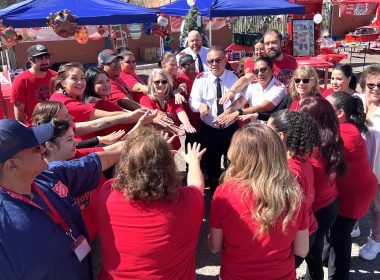 Everyone agrees: our world has not been the same since September 11. We regard each other differently, with more respect. Media personalities who used to berate the president almost seem to hold him in esteem. National and local community pride has swelled. The long arm of compassion that has extended across the Atlantic (from England in particular) has been warmly felt among Americans. Our world has changed and, ironically, it seems almost a better place to be than it was before September 11.
Everyone agrees: our world has not been the same since September 11. We regard each other differently, with more respect. Media personalities who used to berate the president almost seem to hold him in esteem. National and local community pride has swelled. The long arm of compassion that has extended across the Atlantic (from England in particular) has been warmly felt among Americans. Our world has changed and, ironically, it seems almost a better place to be than it was before September 11.
All humankind is capable of exhibiting love, because we were all created in God’s image, and he is love. But the greatest earthly display of love should be among Christians. Jesus said, “By this all men will know that you are my disciples, if you love one another.” (John 13:35) When Jesus spoke these words to his original disciples, they were not perfect examples of love. And neither are we. But let us not get to the place where the secular world educates us in love. For what is the lure of Christianity if it is not love? Isn’t it our love for each other that piques the curiosity of the unsaved? Have we let that love slip into the back seat, replaced in the front by superiority and judgmentalism?
Within the collective walls of the greater church, we still seem willing to sum one another up based on standards of upbringing, wealth, color, and education. But we also have more pious ways of formulating our views of each other. We judge one another’s style of worship. We lambaste those who interpret a passage of Scripture differently, as though we, of course, are sole bearers of the truth and never err in matters of doctrine.
When it comes to doctrine, Scripture is crystal clear on many essential points, such as the nature of God and of salvation. But there are issues which are less crucial “sub-doctrines”, if I may – and godly people, reading the same Scripture, have varied understandings. In these areas we find room for debate and disagreement. But we do not find the latitude to judge the heart of others because they, through earnest searching of the Scripture, come to different conclusions. The person who disagrees with me may well be wrong. Then again, I may well be wrong. When we reach Heaven, we will undoubtedly be shocked to discover which of our pet sub-doctrines were completely askew. But rightness and wrongness aside, none of us is ever in a position to consider himself better than another.
Ideally, the older we get, the more aware we become of our own ignorance. The benefit is that recognizing the gaps in one’s knowledge and understanding is generally accompanied by an openness to learn. In this way, I have learned to respect many different styles of worship. (I cannot confess to agree, however, that all forms of “Christian” worship are appropriate.) I had always believed that the liturgy used in “high church” settings lacked sincerity and inspiration of the Holy Spirit. How ridiculous I was! Not long ago, a professor of mine, who is Episcopalian, nearly came to tears discussing the significance of Christians all over the world reading the same liturgical words and celebrating the same date on the Christian calendar on a given Sunday. I had considered such practices to be wooden; to him, it signified believers all over the world being united in one accord. I had never thought of it that way.
Then there are those prejudices, which are even more base, i.e., judging others by race or riches. Perhaps these habits are so imbedded in our culture that they are difficult to detect, let alone rout out. We learn them as children, they are part of the way we think about people and view the world.
Quite some time ago I wrote about my Sunday school class. It was a class of first and second graders half of them were from comfortable family situations, and half of them were from the Army’s local homeless family shelter. Getting to know one another was a slow and challenging process.
About six months after I wrote about that class, one of the families left the shelter. We did not see them for a while. Then one Sunday, they returned. The “well-bred” Sunday school kids ran to the family and threw their arms around them, exclaiming how happy they were to see them. Shared experiences and shared laughter had formed bonds of friendship. Racial and social barriers had been shattered through the love of Christ.
The world is a delightfully diverse place. From nation to nation, people are different. From door to door, people are different. And from pew to pew, people are different. In theory, none of us would have it otherwise. But in practice, are we prepared to embrace the others?











